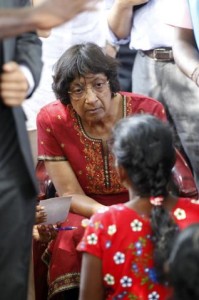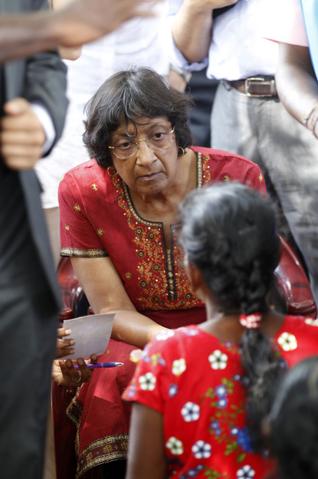A trip over its own feet by Nirupama Subramanian
 |
| MUCH TO DO: While Sri Lanka has taken some steps towards reconciliation, which Ms Pillay noted, it still has a long way to go.(AP) |
As the U.N. Human Rights Council meets once again in Geneva this month, the portents for Sri Lanka are not promising. Later in this session (which began on September 9 and will run until September 27), U.N. High Commissioner for Human Rights Navanethem Pillay will make an oral presentation on Sri Lanka’s human rights situation based on her recent visit to the country. She is to make a written submission in March 2014.
Some credit
Ms Pillay undertook the visit on an invitation from the Sri Lankan government to see for herself the progress that the country has made on post-war reconciliation. The invitation was made against the background of two resolutions on Sri Lanka in the HRC in two successive years. At the end of her week-long visit, she acknowledged the government’s “excellent co-operation” in the planning and execution of a “complex mission,” her longest in any country, and praised it for honouring its commitment that she could go anywhere and meet anyone.
Most of her other observations, though, were nowhere near as complimentary. In a statement to the media in Colombo at the end of her visit, the U.N. official gave more than a hint of what her presentation in Geneva might contain. Ms Pillay’s bombshell conclusion from her week-long visit was that Sri Lanka was moving in an “increasingly authoritarian direction.”
Overreach
Sri Lanka, which has been urged by the HRC to carry out a credible investigation into allegations of violations of human rights and international humanitarian law in the final stages of the war against the LTTE in 2009, has chosen to respond officially by accusing the U.N. of bias, denouncing Ms Pillay for making “political statements” and accusing her of mission overreach.
Foreign Minister G.L. Peiris dubbed Ms. Pillay as being “unfair, wrong and biased,” and said her statement showed a “disturbing absence of balance.” After a meeting between her and Mahinda Rajapaksa, a statement from the President’s office said many Sri Lankans thought of the U.N. as a “pessimistic organisation,” and that Ms Pillay’s report would contain “prejudged matters.” And in a speech to constituents not long after her departure, Mr. Rajapaksa said he wondered how anybody could describe a country that holds elections regularly — a round of provincial elections is being held on September 21, in the north-western, central and for the first time, in the Tamil Northern province — as authoritarian.
Ms Pillay’s concern though was not about the regularity of elections, but, as she made amply clear, with the governance deficit that directly and adversely affects or violates people’s rights. And it was not as if she had to put herself out to find the evidence — even while she was in Sri Lanka, the military questioned several people she met and spoke to in Trincomalee and Mullaithivu. Describing such surveillance and harassment as unacceptable conduct at any time and “extraordinary” while a U.N. rights official was visiting, she was clear she would report the matter to the HRC. Sure enough, in her opening speech at the 24th session on Monday, she flagged her concern about this.
Differing only in the details and emphasis, her overall message to Sri Lanka was no different from what even friends of the Rajapaksa government at home and abroad have been saying in more diplomatic language since 2009: the end of the war is an opportunity; use it wisely — as Ms Pillay wished Sri Lanka had done — to construct a new “all-embracing” state.
This was also the message in the Lessons Learnt and Reconciliation Commission (LLRC) that President Rajapaksa appointed in 2010, and whose report the government commendably made public. Notably, both the 2012 and 2013 HRC resolutions praised the LLRC’s recommendations as constructive, though they stressed that it did not go far enough in recommending actions for transitional justice.
Not enough
Sri Lanka has implemented some of those recommendations, and Ms Pillay noted that, but not enough for substantive progress. It was only a week before the U.N. official’s mission that the government finally appointed a presidential commission to investigate disappearances in the North and East; some land the military had taken over for its high security zones more than two decades ago has been returned to owners; and the Northern province is all set to get its first elected provincial government later this month. But there is no move to investigate allegations that the military deliberately bombed civilian safe havens in the final days of the war. The military still retains an overwhelming presence in the North and East. And the government is seriously considering diluting devolution of powers to provinces, which will undermine what little autonomy provincial assemblies in the Tamil areas are granted by the Constitution’s 13th amendment.
Aside from this, the government has been at best an observer to new emerging fault lines between the majority community and religious minorities even as old ones wait to be addressed. The media feels intimidated after killings and disappearances of journalists; the “white van” phenomenon, long associated with disappearances, is back in southern Sri Lanka even as families in the North and East still cope with a missing son, husband or father.
Ms Pillay made the point that roads and other post-war reconstruction of physical infrastructure, and the resettlement of people on the scale that the Sri Lankan government undertook are commendable achievements, but cannot by themselves bring reconciliation or lasting peace.
Dismissing such concerns as the creation of a biased international system, or of the “LTTE’s agents” within it, has been Sri Lanka’s standard response to any criticism from within or outside the country.
In this instance, Ms Pillay’s Indian Tamil heritage became a point of debate and suspicion. The highly respected 72-year-old South African jurist was accused of being a “Tamil Tigress,” a “tool” of western powers, and an agent of India’s Research & Analysis Wing. One minister was crass enough to declare he wanted to marry her so that he could take her on a trip around the country to teach her Sri Lanka’s history.
Usually, those targeted in this manner have preferred to shrug it off diplomatically. Unexpectedly, in her official statement, Ms Pillay hit out at the aggressive personalisation of her mission as “deeply offensive”; and disappointingly for her detractors, described the LTTE as a “murderous” organisation whose acts the Tamil community should not glorify.
The best course for Colombo would be to understand and address the range of concerns expressed by Ms Pillay. True, the U.N. is not the most perfect organisation, and the international order is stacked against weaker nations. But that does not mean the issues she raised do not exist. Indeed, it is in Sri Lanka’s own long-term interests of reconciliation and lasting peace that it deals with these issues — the earlier, the better. The first step in this would be the conduct of a free and fair election in the Northern Province later this month, and thereafter, allowing the elected government to function without attempts to undermine its powers.
